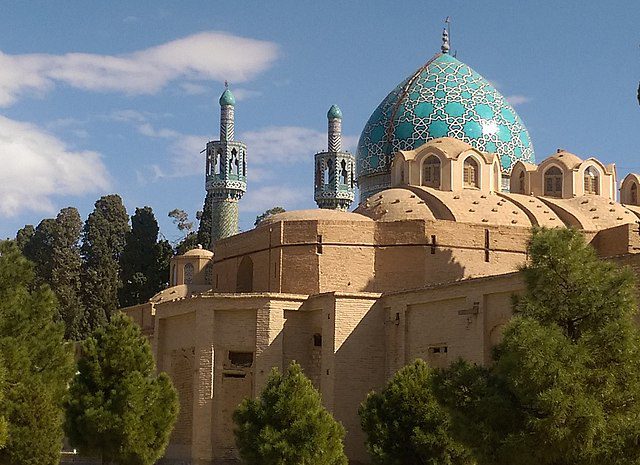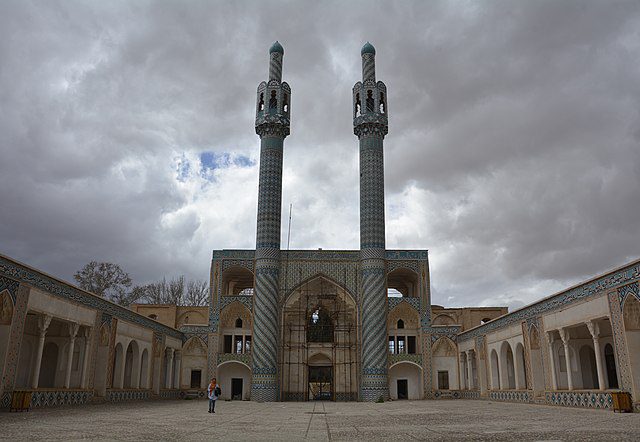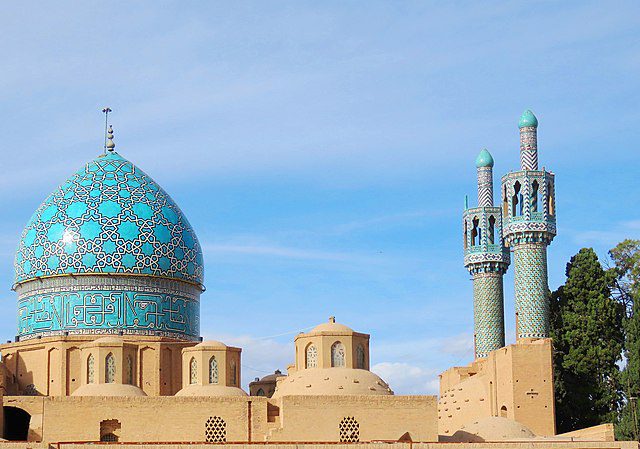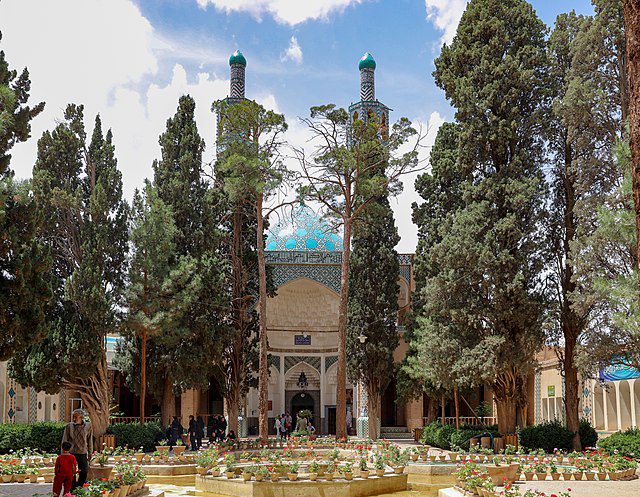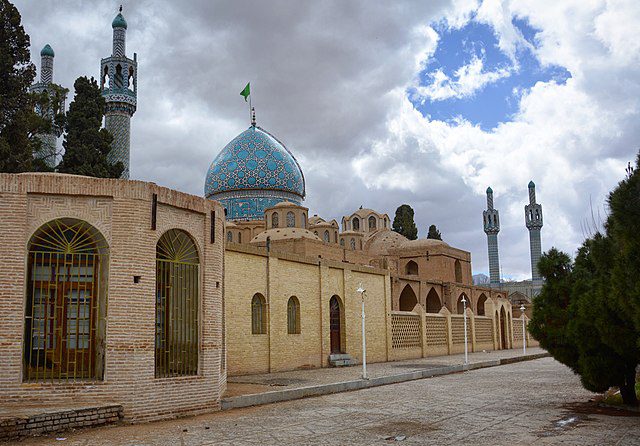Table of Contents
In the heart of Mahan, the Southern province of Kerman in Iran stands the cherished Shah Nematollah Vali Shrine, dedicated to the memory of a significant figure in Iran’s history, Shah Nematollah Vali. His life was marked by deep spirituality, wisdom, and unwavering devotion, making this shrine a fitting tribute to his enduring legacy.
The shrine is a place of great respect, attracting pilgrims and visitors from various places. Its peaceful surroundings and intricate architecture create an atmosphere of calm and reflection. Stepping inside, you’re transported to a world of timeless spirituality, where history and faith come together. Shah Nematollah Vali Shrine isn’t just a place to worship; it’s an inspiring sanctuary that encourages everyone to explore the remarkable life that continues to touch the heart of Iran.
Who Was Shah Nematollah Vali?
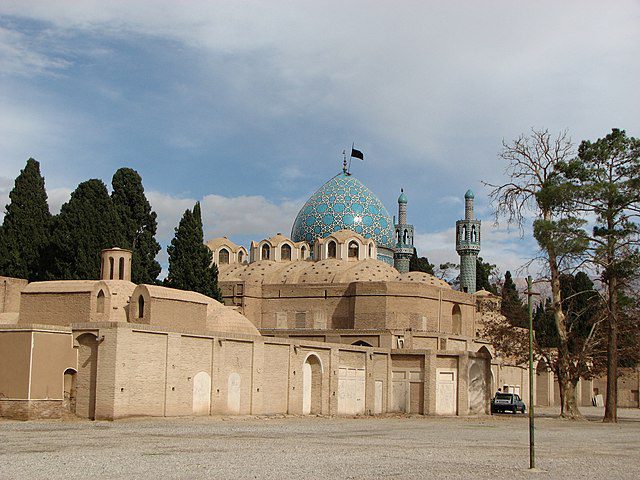
In the early 14th century, Shah Nematollah Vali was born in Aleppo, Syria, a city deeply influenced by the teachings of the famous Muslim philosopher Ibn Arabi, who focused on Sufi metaphysics. Shah Nematollah’s own spiritual path began in his childhood when his father introduced him to Sufi gatherings. He immersed himself in the writings of Ibn Arabi, sought wisdom from the wisest teachers of his time, and embarked on extensive travels across the Muslim world.
Eventually, he found the mentor he had long sought in Mecca. For seven years, he learned by their side, undergoing a profound transformation. Emerging as an enlightened teacher, he set out on a second round of travels. By the time of his passing, his fame had spread not only throughout the Muslim world but also reached India. To his devoted followers, he was a prophet-like figure, a saint, a sage, and the founder of a dervish order. To others, he was celebrated as a great poet, a mysterious figure, and a wise man, leaving behind a legacy that continues to inspire and captivate.
History of Shah Nematollah Vali Shrine
After Shah Nematollah Vali’s passing, his final resting place was a peaceful garden in Mahan. The first person to decide to build a special shrine and dome for him was Sultan Ahmad Shah Bahmani, the King of India. He deeply admired Shah Nematollah Vali and left a valuable ancient inscription on the shrine’s entrance, which still captivates us today, even after more than 550 years.
Originally, the shrine was a simple rectangular building in the middle of a large garden, decorated with beautiful tiles and a stunning dome. Over time, more structures were added around the shrine, shaping it into the impressive monument we see today. These changes mainly took place during the Safavid and Qajar eras when kings held Islamic figures in high regard. When you visit the Shah Nematollah Vali Shrine, you can clearly see a blend of architectural styles from the past six centuries, each telling a part of its rich history.
Structure of Shah Nematollah Vali Shrine
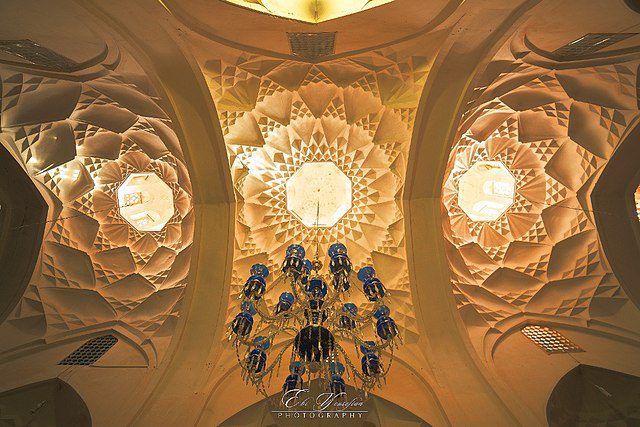
Shah Nematollah Vali Shrine covers an impressive 32,000 square meters and boasts three spacious courtyards. What makes this shrine truly unique is its intriguing link to the number 11, a discovery made by Dutch mathematician Vincent Karels. Karels delved into the mesmerizing turquoise dome of the shrine and uncovered an astonishing pattern: the dome is cleverly divided into 11 equal sections, all taking the shape of triangles. These triangular pieces fit together like a puzzle, with their bases at the bottom of the dome and their pointed tips meeting at the very top, creating a beautiful geometric design.
The choice of 11, an odd number, goes against the usual mathematical division rules for circles. However, in the world of Abjad Numerals, the number 11 holds special meaning, symbolizing Allah or God. This fascinating mix of math and spirituality in the architecture of Shah Nematollah Vali Shrine reveals a deep connection between the earthly and the divine, leaving visitors marveling at the enchanting secrets woven into its very structure.
In the lower part of the Shah Nematollah Vali Shrine, there’s a museum called the Amirieh Mansion. It’s about 130 years old and follows the style of Naser Addin Shah’s time. The museum was renovated in 1978 and houses precious historical artifacts made from bricks and lime. It’s like a time machine, taking you on a journey through history and offering a glimpse into the Qajar era’s grandeur.
How To Get to Shah Nematollah Vali Shrine
To get to Shah Nematollah Vali Shrine, you have two convenient options to choose from:
By Car
To reach Shah Nematollah Vali Shrine by car, head to Gharani Square, and from there, follow the path along Imam Khomeini Street. Continue your drive until you arrive at Emam Khomeini Square. On your right, on Imam Khomeini Street, you’ll find the majestic Shah Nematollah Vali Shrine.
On Foot
If you prefer to explore the shrine on foot, start by locating Emam Khomeini Square and make your way onto Imam Khomeini Street. Within just a few minutes of strolling, you’ll arrive at the captivating Shah Nematollah Vali Shrine.
Recommended Sightseeing Time of Shah Nematollah Vali Shrine
For the most enchanting visit to Shah Nematollah Vali Shrine, aim for late March to early May and mid-September to mid-December. During spring, the gardens bloom in a riot of colors, while autumn offers pleasant weather and a tapestry of warm hues.
To experience its true magic, plan to visit at sunset. The fading sun bathes the shrine in a serene, warm light, creating a captivating play of shadows and highlights on its intricate architecture. It’s a moment of tranquility and reflection, a time when the shrine’s beauty truly shines.
Working Hours of Shah Nematollah Vali Shrine
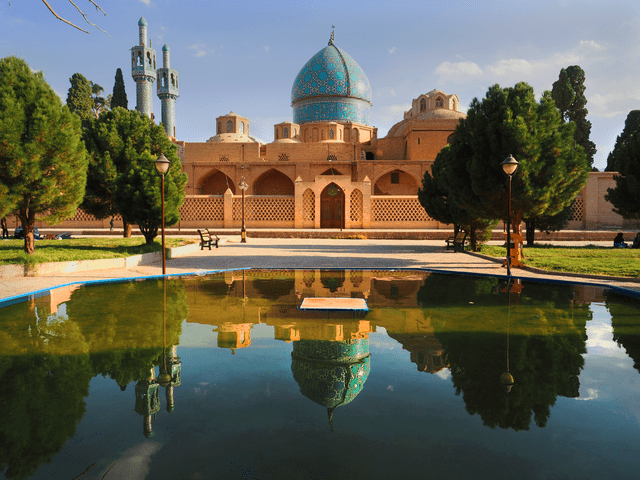
The Shah Nematollah Vali Shrine offers a warm welcome to all from 9 a.m. to 7 p.m. every day of the week. This means you can step into this sacred place whenever it suits you, no matter if it’s a weekday or the weekend.
During these hours, the shrine reveals its historical and architectural wonders for you to explore. The vibrant tiles and serene courtyards create a calming atmosphere, making it a perfect spot for meditation in the morning or an afternoon stroll to soak in the rich history and culture of Persia. With the shrine’s doors open for an extended period each day, you have the chance to connect with its spiritual essence and experience the timeless beauty it holds.
Where to Eat near Shah Nematollah Vali Shrine
If you’re looking to treat your taste buds near Shah Nematollah Vali Shrine, you’ll find a variety of enticing options for delicious meals and sweet treats:
Mahovina Traditional Restaurant
Enjoy a taste of tradition at Mahovina Traditional Restaurant. It’s an excellent choice for savoring authentic local dishes and experiencing the rich flavors of the region.
Zeytoon
Zeytoon offers a delightful dining experience where you can explore a diverse menu of flavors. Whether you’re craving local or international cuisine, Zeytoon has something to satisfy every palate.
Golha Ice Cream Shop
When it’s time for a cool and creamy treat, make your way to Golha Ice Cream Shop. Indulge in a variety of delightful ice cream flavors that will surely refresh you after your visit to the shrine.
Astaneh Ice Cream
If you’re in the mood for more ice cream options, Astaneh Ice Cream is another great choice. They offer a delectable selection of frozen delights to please your sweet tooth.
These nearby establishments ensure that you can enjoy a diverse range of culinary delights and desserts to make your visit near Shah Nematollah Vali Shrine even more memorable.
Where to Stay near Shah Nematollah Vali Shrine
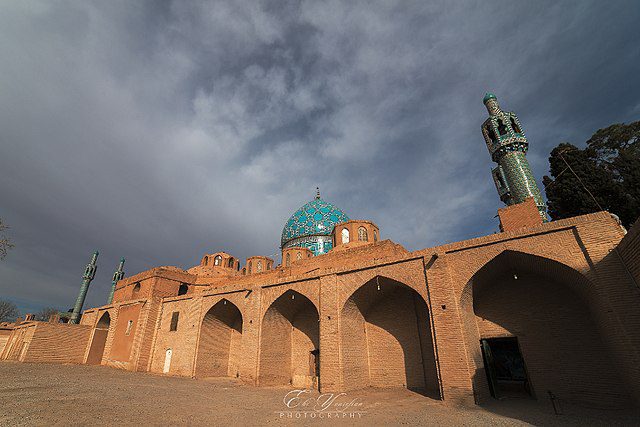
If you’re looking for a place to stay near Shah Nematollah Vali Shrine, you have a few options to consider:
Eyvan Traditional Mahan Hotel
For those seeking a budget-friendly stay, Eyvan Traditional Mahan Hotel is a solid choice. This comfortable and affordable option offers you a convenient location while allowing you to make the most of your visit to the shrine.
Motevalli Bashi Guest House
Another budget-friendly option is the Motevalli Bashi Guest House. This cozy guest house provides a welcoming atmosphere and is an excellent choice for travelers looking for economical yet comfortable lodging near the shrine.
Kerman Jahangardi Hotel 2
If you prefer a more luxurious experience, the Kerman Jahangardi Hotel 2 offers a touch of extravagance. While it may be pricier, it provides a higher level of comfort and amenities for those who want to indulge in a lavish stay during their visit to Shah Nematollah Vali Shrine.
These accommodation choices ensure that you can find the perfect place to suit your preferences and budget while enjoying your time near this remarkable shrine.
Other Attractions near Shah Nematollah Vali Shrine
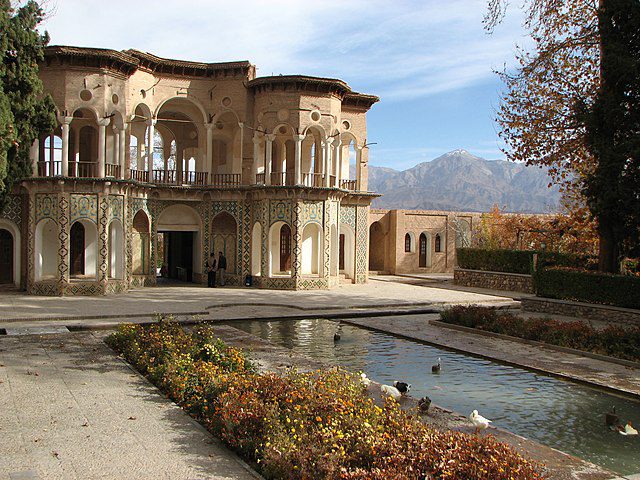
Shazdeh Garden isn’t too far from Shah Nematollah Vali Shrine, just about 5.5 kilometers away. This beautiful garden is like a green paradise in the middle of the desert. When you step inside, it’s like entering a colorful and fragrant wonderland.
In Shazdeh Garden, you’ll find all kinds of natural beauty. There are layers of green gardens, sparkling fountains, and lots of pretty flowers. The paths wind around, and as you walk, you’ll see different angles of this amazing place. There’s a special building in the middle of the garden, and from there, you can see the vast desert surrounding the area. It’s a cool contrast between the shrine and the lush garden.
Shazdeh Garden shows how people and nature can come together to create something really special, making it a must-see if you’re looking for peace and beauty in the Iranian desert.
FAQs about Shah Nematollah Vali Shrine
Q1: Who was Shah Nematollah Vali?
A1: Shah Nematollah Vali was a significant figure in Iran’s history, born in Aleppo, Syria, in the early 14th century. He was deeply influenced by the teachings of the famous Muslim philosopher Ibn Arabi and became a renowned Sufi mystic, poet, and the founder of a dervish order.
Q2: What is the history of the Shah Nematollah Vali Shrine?
A2: The Shah Nematollah Vali Shrine was built in honor of Shah Nematollah Vali by Sultan Ahmad Shah Bahmani, the King of India, over 550 years ago. It started as a simple rectangular building in a garden and evolved over time, reflecting various architectural styles from the Safavid and Qajar eras.
Q3: What is the structure of the Shah Nematollah Vali Shrine?
A3: Shah Nematollah Vali Shrine covers 32,000 square meters and features three spacious courtyards. Notably, the shrine’s turquoise dome is divided into 11 equal triangular sections, a unique architectural feature with symbolic significance in Abjad Numerals.
Q4: How do I get to the Shah Nematollah Vali Shrine?
A4: You can reach Shah Nematollah Vali Shrine by car by heading to Gharani Square and following the path along Imam Khomeini Street. Alternatively, you can explore it on foot by starting at Emam Khomeini Square and walking to the shrine.
Q5: What are the working hours of Shah Nematollah Vali Shrine?
A5: Shah Nematollah Vali Shrine is open to visitors from 9 a.m. to 7 p.m. every day of the week. This extended schedule allows you to explore the shrine’s historical and architectural wonders at your convenience.
Last Words: Discover the Wonders of Shah Nematollah Vali Shrine with Customized Tours
The Shah Nematollah Vali Shrine in Mahan, Kerman province, honors the memory of Shah Nematollah Vali, a revered historical figure in Iran known for his deep spirituality and dedication. This shrine, with its peaceful surroundings and beautiful architecture, attracts pilgrims and visitors. Inside, it offers a serene and timeless spiritual experience that encourages people to explore Shah Nematollah Vali’s remarkable life, which remains cherished in Iran.
When it comes to experiencing the rich cultural and historical tapestry of Iran, particularly the enchanting Shah Nematollah Vali Shrine, embarking on a customized and tailored tour is the key to unlocking an unforgettable journey. Enter To Iran Tour, your trusted partner in exploring the marvels of Iran. Our team of experienced professionals is committed to providing you with an immersive experience that goes beyond the surface.
Embark on a memorable adventure with To Iran Tour, and let us help you create cherished memories while exploring the beauty, history, and culture of Iran.

